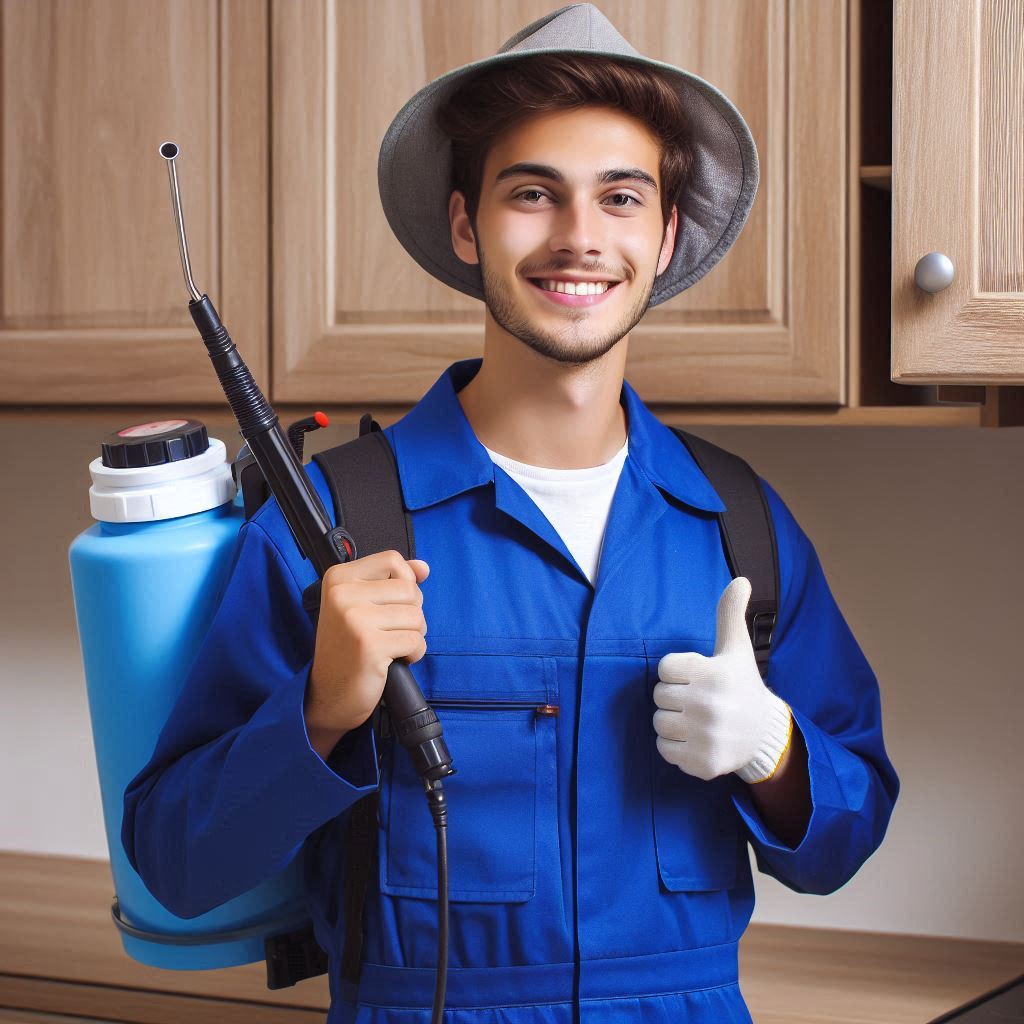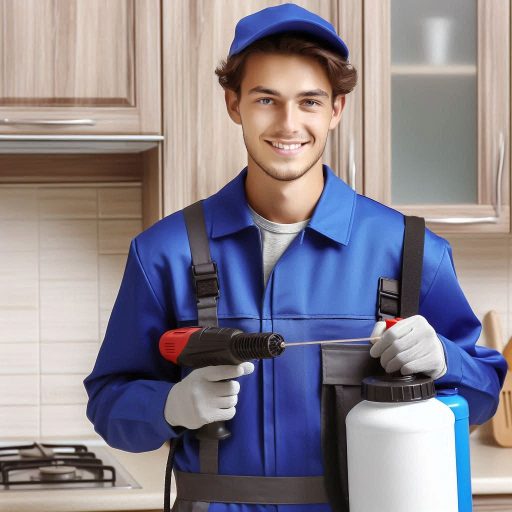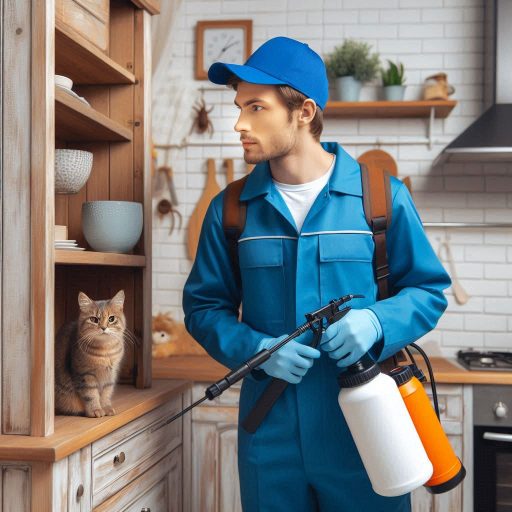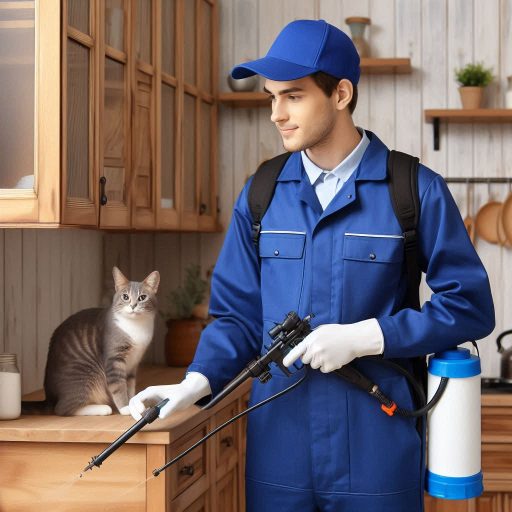Introduction
Pest control workers play a critical role in keeping environments safe and healthy.
They manage pests that threaten homes, businesses, and public spaces.
Their job ensures that infestations are contained and health risks are minimized.
What is a Pest Control Worker?
A pest control worker is a trained professional responsible for identifying, managing, and preventing pest infestations.
These workers use various tools, chemicals, and strategies to eliminate pests like rodents, insects, and termites.
Importance of Pest Control in Society
Pest control is essential for maintaining public health and preventing property damage.
Left unchecked, pests can cause serious harm.
Some key benefits of pest control include:
- Protecting public health: Pests can spread diseases like salmonella and Lyme disease.
- Preserving food supply: Pest control prevents contamination in food production and storage.
- Safeguarding property: Termites and rodents can destroy buildings and infrastructure.
- Promoting hygiene: Regular pest control ensures clean and safe living environments.
By understanding their roles and responsibilities, pest control workers help maintain a balanced ecosystem and protect society from harmful pests.
Roles of a Pest Control Worker
Pest control workers play a crucial role in maintaining healthy environments.
Their work helps prevent the spread of pests and diseases.
Below are the primary roles of a pest control worker:
Inspecting Properties for Signs of Pests
The first step in pest control involves inspecting properties for pest signs.
Workers examine both the interior and exterior of buildings.
They look for droppings, nests, or damage caused by pests.
Additionally, they check common entry points like doors, windows, and vents.
A thorough inspection helps identify the extent of the infestation.
Workers often use specialized tools to detect hidden infestations.
This process ensures that they gather enough information for effective treatment.
Identifying the Type of Pests and Level of Infestation
After inspecting, pest control workers identify the type of pests present.
Recognizing the specific species is crucial for effective control.
Different pests require different treatment methods.
Workers assess the level of infestation by evaluating pest numbers and activity.
They consider factors such as food sources and nesting sites.
This evaluation helps determine the best approach for eradication.
Accurate identification and assessment are essential for successful pest management.
Implementing Pest Control Measures
Once pests are identified, workers implement pest control measures.
They may use traps, baits, or pesticides based on the situation.
Each method aims to eliminate pests while minimizing risks to humans and pets.
In some cases, exclusion methods are employed to prevent reentry.
This involves sealing entry points and creating barriers.
Workers follow safety guidelines to ensure the effective and safe application of treatments.
They also monitor the results of their interventions closely.
Educating Clients on Preventing Future Infestations
Pest control workers play an important role in client education.
They provide clients with information on preventing future infestations.
Workers explain how pests enter homes and what attracts them.
They offer practical tips, such as sealing food containers and maintaining cleanliness.
Clients learn the importance of regular property inspections to catch issues early.
Educating clients empowers them to take proactive measures against pests.
This long-term approach helps reduce the likelihood of recurring infestations.
Pest control workers have diverse responsibilities.
They inspect properties, identify pests, and implement control measures.
Their role extends to educating clients on prevention strategies.
Through these efforts, pest control workers help maintain healthy and pest-free environments.
Their expertise ensures that homes and businesses remain safe and comfortable.
By understanding their roles, clients can better appreciate the importance of pest control services.
This awareness fosters collaboration between clients and pest control professionals.
Read: Educational Requirements for Childcare Workers Explained
Responsibilities of a Pest Control Worker
Pest control workers have vital responsibilities that ensure effective and safe pest management.
Their roles extend beyond extermination to encompass various critical tasks.
Below are the key responsibilities of a pest control worker:
Ensuring Compliance with Safety Regulations
Pest control workers must adhere to safety regulations at all times.
They follow local and national guidelines for handling chemicals and equipment.
This compliance protects both the workers and the environment.
Workers receive training on safety protocols to minimize risks.
They wear protective gear, such as gloves and masks, during treatments.
Regular safety audits help maintain high standards in pest control operations.
These measures ensure the well-being of clients, pets, and the general public.
Using Environmentally Friendly and Humane Pest Control Methods
In recent years, the demand for environmentally friendly pest control has increased.
Pest control workers prioritize using humane methods whenever possible.
They assess pest problems and choose eco-friendly solutions that are effective yet safe.
This approach reduces the environmental impact of pest control operations.
Workers may employ traps, biological control agents, or organic pesticides.
Their goal is to manage pests without harming beneficial insects or the ecosystem.
By using sustainable methods, workers contribute to a healthier environment.
Keeping Detailed Records of Treatments and Inspections
Accurate record-keeping is essential for pest control workers.
They document all inspections, treatments, and client interactions.
These records help track pest activity and treatment effectiveness.
Workers also note any follow-up visits or ongoing issues.
This documentation aids in compliance with regulations and client communication.
Detailed records provide valuable data for assessing treatment outcomes.
This information is crucial for refining pest control strategies over time.
Maintaining Equipment and Staying Up-to-Date on New Pest Control Techniques
Pest control workers must maintain their equipment in good condition.
They regularly inspect and service tools to ensure proper functioning.
This maintenance prevents equipment failures during critical operations.
Additionally, workers stay informed about new pest control techniques and technologies.
They participate in training sessions and workshops to enhance their skills.
Keeping up-to-date allows them to provide the best services to clients.
Adopting new methods can lead to more effective pest management solutions.
Pest control workers carry significant responsibilities in their field.
They ensure compliance with safety regulations and prioritize humane methods.
Their record-keeping practices support effective pest management.
Additionally, maintaining equipment and staying updated on new techniques enhance service quality.
Through these responsibilities, pest control workers contribute to safer environments for everyone.
Their expertise is crucial in managing pest problems effectively and sustainably.
By understanding their responsibilities, clients can appreciate the professionalism of pest control services.
This knowledge fosters trust and collaboration between clients and pest control professionals.
Transform Your Career Today
Unlock a personalized career strategy that drives real results. Get tailored advice and a roadmap designed just for you.
Start NowRead: Top Certifications for Advancing in Childcare Careers
Challenges Faced by Pest Control Workers
Pest control workers encounter various challenges in their line of work.
These challenges can impact their effectiveness and job satisfaction.
Below are some key challenges faced by pest control workers:
Dealing with Hazardous Chemicals
One of the main challenges involves handling hazardous chemicals.
Pest control workers often work with pesticides and other toxic substances.
They must follow strict safety protocols to avoid exposure.
This includes wearing protective gear and using proper application techniques.
Even with precautions, the risk of accidents can be a concern.
Workers must stay informed about the latest safety regulations.
They also need to ensure proper storage and disposal of chemicals.
Balancing effectiveness and safety is a constant challenge in their daily tasks.
Working in Various Weather Conditions
Pest control workers face unpredictable weather conditions while on the job.
They often work outdoors, exposing themselves to the elements.
Extreme heat, cold, rain, or humidity can hinder their performance.
Workers must adapt their strategies based on the weather.
For example, rain may make it difficult to apply certain treatments.
They also need to stay hydrated and protected from sun exposure.
Working in adverse conditions can lead to physical exhaustion and affect job efficiency.
Handling Difficult Clients or Sensitive Situations
Dealing with difficult clients is another significant challenge.
Some clients may have unrealistic expectations about pest control results.
Others might be anxious or fearful about pest infestations.
Workers must manage these emotions and communicate effectively.
They need to explain treatment processes and set realistic timelines.
Additionally, pest control workers sometimes encounter sensitive situations, such as infestations in homes with children or pets.
Navigating these situations requires empathy and professionalism.
Balancing client satisfaction with effective pest management adds to the challenge.
Managing Time and Workload Effectively
Time management is crucial for pest control workers.
They often juggle multiple appointments and tasks in a single day.
Balancing inspections, treatments, and paperwork can be overwhelming.
Delays or unexpected issues can disrupt schedules and create stress.
Workers must prioritize tasks and manage their time efficiently.
Effective communication with clients can help streamline operations.
This includes informing them about delays or changes in scheduling.
Proper time management ensures that workers meet client needs while maintaining high-quality service.
Pest control workers face several challenges in their roles.
They must handle hazardous chemicals while ensuring their safety.
Adapting to various weather conditions requires flexibility and resilience.
Dealing with difficult clients or sensitive situations demands excellent communication skills.
Finally, managing time and workload effectively is crucial for success.
Understanding these challenges helps clients appreciate the complexity of pest control work.
By recognizing these hurdles, clients can foster better relationships with pest control professionals.
This collaboration leads to improved pest management outcomes and enhanced client satisfaction.
Read: How to Balance Work and Personal Life in Childcare

Discover More: Career Advancement Opportunities in Pest Control
Skills Required for a Successful Career in Pest Control
A successful career in pest control demands various skills.
These skills enable workers to effectively manage pest infestations and meet client needs.
Here are the essential skills required for pest control professionals:
Attention to Detail and Problem-Solving Skills
Pest control workers must have strong attention to detail.
They need to identify subtle signs of pest activity during inspections.
This meticulousness helps prevent infestations from escalating.
Workers also require effective problem-solving skills to develop treatment plans.
Each pest situation presents unique challenges that need innovative solutions.
They must analyze pest behavior and determine the most effective control methods.
This analytical approach ensures successful outcomes for clients.
Strong Communication and Customer Service Skills
Effective communication is crucial in pest control.
Workers must clearly explain treatment options and processes to clients.
They need to listen to client concerns and address any questions.
Strong customer service skills help build trust and rapport with clients.
This relationship fosters a positive experience and encourages repeat business.
Workers should also provide clients with tips on pest prevention.
Educating clients empowers them to take proactive measures, enhancing satisfaction and reducing future issues.
Ability to Work Independently and as Part of a Team
Pest control workers must be versatile in their work approach.
They often work independently, managing their schedules and tasks.
This independence requires self-motivation and discipline to complete assignments.
However, teamwork is equally important in pest control operations.
Workers may collaborate with colleagues on larger projects or challenging infestations.
Effective teamwork ensures that everyone is aligned and can share expertise.
Balancing independence with teamwork helps create a cohesive work environment.
Physical Stamina and Agility for Inspecting and Treating Properties
The job of a pest control worker demands physical stamina and agility.
Workers often perform physically demanding tasks, such as lifting equipment and climbing ladders.
They may also crawl into tight spaces to inspect properties.
Maintaining good physical health is essential for their performance.
Additionally, agility helps workers navigate different environments, both indoors and outdoors.
This physical capability ensures they can effectively inspect and treat various properties.
A successful career in pest control requires a diverse skill set.
Attention to detail and problem-solving skills are vital for effective pest management.
Strong communication and customer service skills foster positive client relationships.
The ability to work independently and as part of a team enhances operational efficiency.
Lastly, physical stamina and agility support the demands of the job.
Developing these skills helps pest control workers excel in their careers.
Clients can benefit from skilled professionals who provide high-quality pest management services.
Recognizing these essential skills fosters appreciation for the pest control industry.
Read: Best Pet Grooming Schools in the United States
Explore Further: How to Handle Difficult Clients as an Agent
Training and Certification for Pest Control Workers
Training and certification are essential for pest control workers.
These processes ensure that professionals are knowledgeable and competent.
Below are key aspects of training and certification in this field.
State Licensing Requirements for Pest Control Workers
Most states require pest control workers to obtain a license.
Licensing ensures that workers meet specific educational and training standards.
Each state has its own regulations regarding licensing requirements.
Workers typically need to pass an examination covering pest identification and treatment methods.
Some states require a background check before granting a license.
Understanding local regulations is crucial for compliance and successful licensing.
Licensed workers can operate legally and provide services to clients.
On-the-Job Training and Apprenticeships
On-the-job training is vital for new pest control workers.
Many companies offer apprenticeship programs to provide practical experience.
These programs pair trainees with experienced professionals for hands-on learning.
Trainees learn how to inspect properties, identify pests, and apply treatments.
This experience builds confidence and competence in real-world situations.
Apprenticeships also teach safety protocols and customer service skills.
Workers gain valuable insights into daily operations and best practices.
Continuing Education and Professional Development Opportunities
Continuing education is crucial in the pest control industry.
Workers must stay updated on new technologies, products, and methods.
Many states require pest control professionals to complete continuing education credits to maintain their licenses.
Workshops, seminars, and online courses provide valuable learning opportunities.
Professional organizations often offer resources for ongoing education.
Participating in these opportunities helps workers stay competitive and knowledgeable.
Importance of Staying Current on Industry Regulations and Best Practices
Staying current on industry regulations is vital for pest control workers.
Laws and guidelines frequently change, impacting pest management practices.
Knowledge of these regulations ensures compliance and enhances service quality.
Workers should also familiarize themselves with best practices in pest control.
This knowledge helps them provide effective and environmentally friendly solutions.
Regularly reviewing industry updates and attending training sessions keeps workers informed.
Staying current ultimately leads to better client satisfaction and successful pest management outcomes.
Training and certification are essential for pest control workers.
State licensing ensures compliance with local regulations.
On-the-job training and apprenticeships provide practical experience.
Continuing education and professional development keep workers informed about industry changes.
Finally, staying current on regulations and best practices is crucial for success.
By investing in training, pest control workers enhance their skills and knowledge.
This commitment to professionalism benefits both the workers and their clients.
Understanding the importance of training fosters appreciation for the pest control industry.
Transform Your Career Today
Unlock a personalized career strategy that drives real results. Get tailored advice and a roadmap designed just for you.
Start NowDiscover More: Loan Officer Mentorship: Finding and Being a Mentor
Conclusion
Pest control workers play a vital role in managing pest infestations.
Their responsibilities include inspecting properties, identifying pests, and implementing control measures.
They educate clients on prevention strategies and maintain detailed records of treatments.
These professionals contribute significantly to public health and safety.
Effective pest management helps prevent the spread of diseases and protects food sources.
By addressing infestations promptly, pest control workers safeguard homes and businesses.
For those interested in pursuing a career in pest control, ample opportunities await.
The industry values dedicated and skilled individuals who are passionate about pest management.
Training and certification provide the necessary knowledge and expertise for success.
Aspiring pest control workers should seek apprenticeships and continuing education programs.
These experiences will enhance their skills and understanding of the field.
With a commitment to professionalism and a focus on client satisfaction, they can thrive in this career.
Pest control workers play a crucial role in ensuring healthy environments.
Their expertise and dedication help maintain public safety and well-being.
A career in pest control offers rewarding challenges for those who choose to embark on this path.
[E-Books for Sale]
The Big Book of 500 High-Paying Jobs in America: Unlock Your Earning Potential
$19.99 • 500 High-Paying Jobs • 330 pages
Explore 500 high-paying jobs in America and learn how to boost your career, earn more, and achieve success!
See All 500 High-Paying Jobs of this E-Book
1001 Professions Without a Degree: High-Paying American Jobs You Can Start Now
$19.99 • 1001 Professions Without a Degree • 174 pages
Discover 1001 high-paying jobs without a degree! Unlock career tips, skills, and success strategies for just $19.99!




